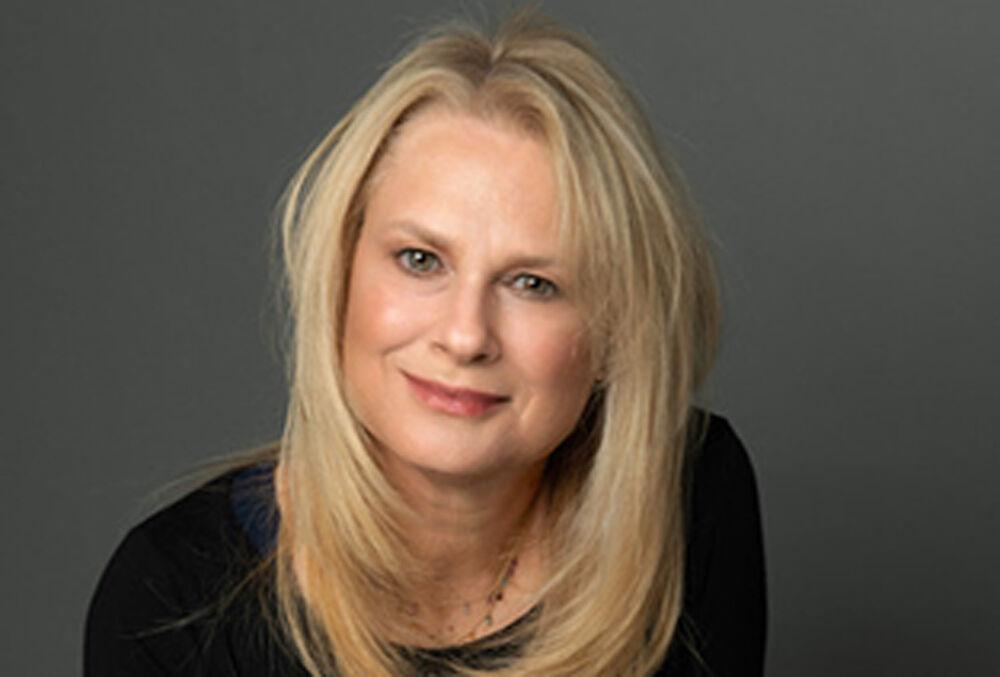
How many times have any of us thought about completely changing our life and starting a brand new job or experience? Nancy Steiner did just that. She is a Peabody Award-winning producer, documentarian, director and journalist. After facing a life-threatening illness, Nancy made a life-changing decision to move on from that successful career of 38 years and become an impactful executive coach.
My purpose was going to be to help people move forward with their own stories rather than glean their stories, which I had done for the previous 38 years. Now, I can help them write their next chapters themselves.
Nancy Steiner
I wanted to know more from, and about, this remarkably talented woman who says there is no wrong time to change direction if you commit yourself.
EYE: What made you decide to pivot from journalism, Nancy, and become an executive life coach?
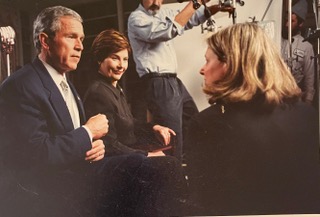
NANCY STEINER: There were a few factors. One was it became increasingly difficult to raise money for documentary projects. I switched and I became a producer at the Council on Foreign Relations, a global think tank. I did 52 pieces for them on global diplomacy, seen in over 100 countries. And after I did that, my colon ruptured, which was very terrifying.
Out of nowhere, I had an acute case of diverticulitis that took me into the hospital. While I was in the hospital, my colon broke and there was a big old abscess right there, and sepsis was knocking at my door. In order to essentially save my life, I was put into an emergency surgery situation for many hours.
I came out of that with a bag for six weeks. Then I had another surgery to get rid of the bag and just recover from everything.
EYE: What incredible challenges! What was going through your mind?
NANCY: During that time, I had an opportunity for the first time in probably 40 years to rethink my life. Just stop everything. I had seen in an up-close and personal way that anything can happen at any time. I wanted to seize the moment and do work that would have an immediate impact on people’s lives, that was tangible.
So in a way, it was kind of a natural progression because as a coach, I’m able to utilize my skills as an interviewer and bring people out and have them feel safe and comfortable and in their own life stories as they create the next chapters.
EYE: How did you decide on becoming an executive life coach?
NANCY: In fact, what happened was my genius therapist, Mark Banschick, said to me, “You know, Nancy, you’re a coach. You’ve always been a coach. You might as well go get some training.” So I thought life coaching… what is that? I was very skeptical of it.
He connected me to an organization called iPEC, which is sort of a gold standard coaching outfit that he had heard about. So I looked into iPEC and many other coaching outfits to see which one I thought was going to be the best fit for me. I discovered that iPEC seemed like a good idea.
EYE: What did you have to go through to finally do this?
NANCY: It was brutal. I mean, brutal and seemingly endless. Fourteen months of rigorous coaching, being coached and coaching other coaches in training. I got my Masters Certification, so I took it as far as I could take it, and that was really gratifying.
But it took a ton of work, several papers that were over 60 pages, just a remarkable depth of self-examination and then learning the tools of the trade.
EYE: Did you find that your journalism experience played into your learning and methods?
NANCY: I can’t really separate myself from journalism. I’m always going to be a journalist. I’m always going to have a journalistic curiosity about other people in the world. And, in that way, it helped me enormously. As journalists, we have to listen carefully to conversations and learn when to be quiet and when to speak, and coaching takes that to a whole new level.

EYE: I read your coaching includes student entrepreneurs at Harvard to a group that is over 60. Do you see patterns or any similarities in what your clients are dealing with and facing?
NANCY: There are always similarities because the future is unknown to everyone, and everybody who comes to coaching wants to get a grip on it, find their footing. So whether or not you’re a whippersnapper Harvard MBA candidate trying to get your company launched, or you are a 70-year-old business person trying to make sure that your company can get to the next level it needs to get to, everybody’s in that same seat.
They are asking how can I do better, where is my weakness, how can I be stronger and see some tangible results as soon as possible?
Everybody wants to be ASAP on everything, and coaching is great that way because you do see tangible results fast. That’s also one of the more gratifying things for me because I can get on the phone with somebody and in a space of an hour, I can hear them shift from feeling completely lost to really feeling like they know where they’re going.
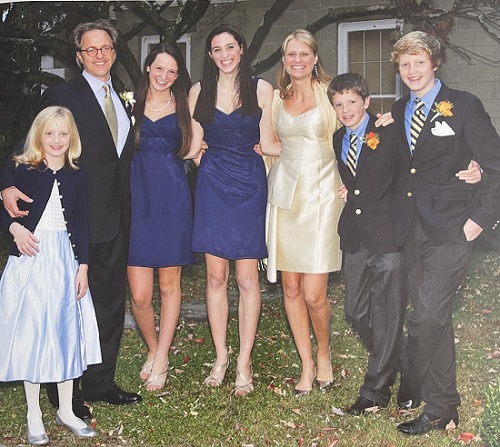
EYE: What kind of experience do you bring?
NANCY: I’ve been a successful journalist traveling the world, meeting the very richest and the very poorest of what this world has to offer coupled with being divorced, remarried, blending a family with five children successfully. That range of experience comes into every conversation that I have coaching and not coaching, an authenticity and honesty. It’s who I am.
EYE: Is there any right or wrong time to consider changing direction in life?
NANCY: I think there’s no right or wrong time. I don’t believe there are any “shoulds” in this or anything else. You can make it as easy as you want it to be or as complicated as you decide, for whatever reason, to make it. It’s really a matter of how committed you are. I could have found a million reasons not to do this. Why, when I have 40 years of producing behind me, would I want to stop and give that up?
EYE: Professionally and personally, what were the biggest hurdles you faced in becoming a coach?
NANCY: I didn’t understand anything about coaching when I started this; I didn’t understand that companies hire coaches. It was not a world I was at all familiar with. So that was a hurdle. And then I had to get past my prejudice against it: thinking that people who can’t decide what to do in life become coaches.
Every single thing I thought about coaching was wrong. I thought I was going to walk into a room of people who would be maybe not so well educated. These were really accomplished, savvy, super hip, many of them super chic, some of them had very interesting careers and wanted to add to their lives.
EYE: So personally, you had to overcome your own prejudices. How did you push through that?
NANCY: I was really impressed by iPEC. I loved my leader of the class. He was tough, smart, and he could have stepped out of a chorus line. He was theatrical, engaging, kind of brilliant and very cool. That’s probably what hooked me. I thought Wait a minute, this is amazing. What he’s talking about is amazing stuff.
I then wanted it to work so badly. There were times during the training that were really tough and embarrassing. A couple of times I went into the bathroom and cried feeling like this is just going to be so hard. But I got through those things and came out the other side.
EYE: What surprises you the most now in being an executive coach?
NANCY: How much fun it is. How well it works. It’s actually not a magic bullet that’s going to get anybody anywhere but with real work, and working together, it can happen.
I think what surprises me is that I haven’t lost interest in it. I just want to get better and better. You know, I love doing it right now.
EYE: You’re so supportive and obviously a good guide and very curious. Have you always been like this even as a kid?
NANCY: I think I’ve always been a loving person and a very honest person. I’ve always been very curious about people. I used to have a little tape recorder when I was eight and interview people with it. Since college, I’ve had a very clear sense of gratitude to my family for supporting me and I want to give that back.
That’s really why I turned the corner from filmmaking to coaching. I also had five very close friends who died. I felt like I kept being hit on the head with a hammer saying, life is fragile, life is fragile. Carpe, carpe, carpe. This filmmaking is fun, exciting and challenging, but I don’t know if I’m really helping anybody when they see these pieces unless they write to me. But if I’m coaching somebody, I’ll know in every day that I’ve made an impact.
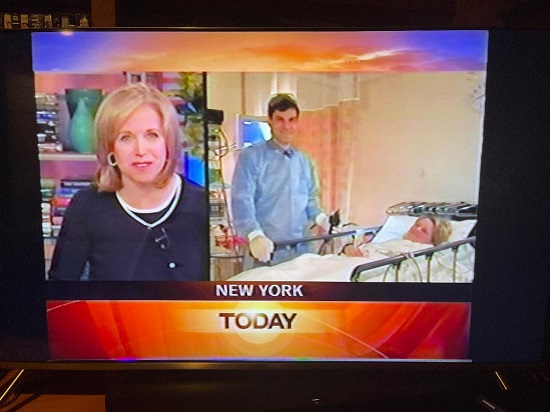
EYE: Going back to your journalistic chapter now, what were you most proud of?
NANCY: I would say the story that I’m proud of is having a colonoscopy, live, on the Today Show. I also produced Katie Couric’s colonoscopy. Hers was taped. It really helped people get screened; especially women, who had never thought they needed colonoscopies. So I’m really proud of that work.
EYE: Was there a documentary or a news story that particularly resonated with you?
NANCY: I’m really proud of a meaningful story that I did about the late Unita Blackwell, the Mayersville, Mississippi Mayor reelected four times of the same town that had refused her the right to vote. She had been beaten by the Klan, had torches burned on her lawn, was a civil rights leader and an activist in one of the poorest single congressional districts in this country.
Once the story ran on NBC, I did a profile of her. I then nominated Unita for The John F. Kennedy Library Profile in Courage award, where she would receive a stipend and come to the JFK Library. Unita didn’t win, but she became the only person of color to be a finalist and the only woman. Her picture and her story ended up in USA today. And then because of that, she was granted a MacArthur Genius Fellowship.
She got something around $250,000. Then she was invited by Harvard to be come teach at the Kennedy School of Government. So that was really great, really rewarding and fun, and I adored her.
EYE: Now that you’ve moved into coaching from producing such impactful stories, are there any key pieces of advice that you can share when people want to pivot?
NANCY: Trust your gut. I keep saying that and it sounds so cheesy, but listen to your to the voices inside your head. Keep a journal, write down your thoughts.
EYE: So a pivot really is more than just changing jobs.
NANCY: It is. It’s rethinking how you’re prioritizing your time, what you want to have said at the end of the day, Here’s what I did. Here’s who I was. Here’s who I am. Here’s who I want to be tomorrow.
EYE: I’m wondering how much you are also learning about yourself from the coaching you do.
NANCY: I can’t even begin to tell you there’s no limit there. I’ve learned stuff I never imagined I would be learning. For example, I learned how to let go of stuff; how to manage anxiety or fear; how to take care of myself and become really independent of my husband, my children, my sisters.
Even more…just to be myself and just be able to trust myself every day. So I’ve learned a lot from coaching. It’s a gift, a complete gift.
EYE: So, where do you go from here?
NANCY: I want to reach more people and continue to be curious and to build on the impact I want to have.
EYE: Any final thoughts, Coach?
NANCY: It’s so important to turn what feels like a problem into an opportunity because there are opportunities to be found in the worst situations. And one of the opportunities is to learn about the people who are helping you.
When I was in the hospital, I was curious about how they got to my room, that hospital room, who they are, their parents, their spouses, you know, their children, they all have lives and they all have stories.
It’s really important to me that people realize that there are ways of being curious and kind in the darkest, darkest hours that will help them enormously be their best and brightest the next 10 days after that. You know, it’s sort of like a wheel: the more you give back to the world, the world will give back to you.
EYE: Thank you, Nancy, for your time and insights! Continued success to you and the lucky people who can call you “Coach!”
Lead photo: Maggie Peters
How to find Nancy Steiner:
Website: steinercoachingsolutions.com
LinkedIn: Nancy Steiner
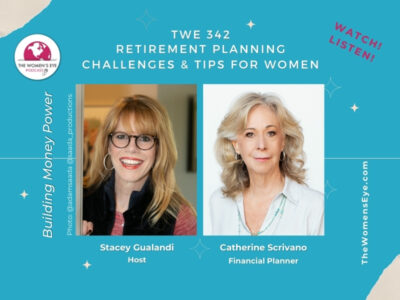


Leave a Reply